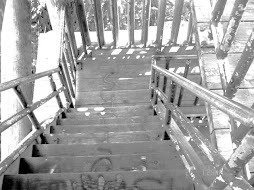Well its been about a week now since we have left the topic of The Things They Carried in class, and I was feeling a little overwhelmed with the innumerable topics available to discuss. As I was sifting through the book again, rethinking many of the quotes and excerpts, I was once again struck with the ever presence of death within life. I feel that as youthful students living in free and peaceful America, our perspective of life is simply unrealistic and whimsickle. Somehow we manage to daily avoid the simple and terrifying fact that we are going to die, (and in the not so distant future I might add). It is a truth that noone can avoid. Yet, i found it not only curious, but bothersome to see how we continue to live as though death doesn't matter.
How often can one find examples of the evasion of death in our own culture. I don't know about you, but I see it everywhere. Think about our funerals. They are an excellent example because they are, for many of us, the only time when we are seriously confronted with death. When you consider what we do to that poor body all to make ourselves feel better, it really can astound. We take the rotting corpse of the deceased, clean it and dress it to near perfection in an attempt to preserve it for as long as possible. We dress it up like a doll, adding makeup to the face to bring back lifelike color and dressing it in only the highest quality clothing. Does all the unnecessary embalming and beautification of the deceased body really change the fact that the guy/gal is dead? Nope, but somehow helps to make the enire concept of death more bearable and understandable to those who finally have to face it.
I am sure that the young men who went off to war in Vietnam had a similarly sugar coated American perspective of death entering the war as the one that we tend to have today. In the war there was no time or space to reason away the fact of death as we do at home. It was unexpectadly thrusted out into the faces of these poor soldiers. There was no way to avoid or censor it. In that moment recounted by O'Brien when Curt Lemon was blasted to countless pieces death became more real to those men than it ever had before. One has to wonder what the effects of such immediate exposure can be. Well, wonder no longer. O'Brien gives us the answer on page 81:
"Any soldier will tell you, if he tells the truth, that proximity to death brings with it a corresponding proximity to life. After a firefight, there is always the immense pleasure of aliveness. The trees are alive. The grass, the soil-everything. All around you things are purely living, and you among them, and the aliveness makes you tremble. You feel an intense, out-of-the-skin awareness of your living self-your truest self, the human being you want to be and then become by the force of wanting it. In the midst of evil, you want to be a good man. You want decency. You want justice and courtesy and human concord, things you never knew you wanted. There is a kind of largeness to it, a kind of godliness. Though it's odd, you're never more alive than when you're dead."
It almost makes you wish we could all experience death...like that. Hmmmmmm...
Thursday, October 11, 2007
Subscribe to:
Posts (Atom)
